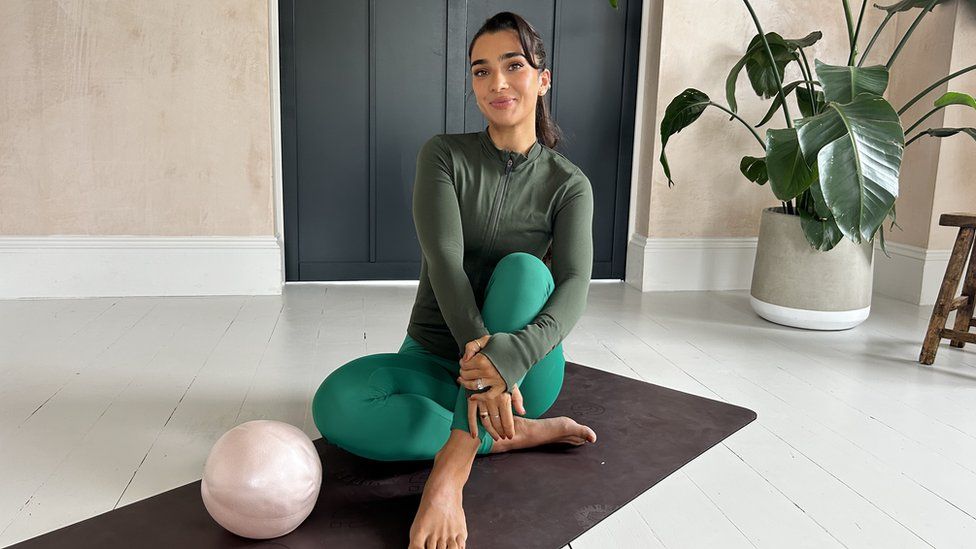ARTICLE AD BOX

Stef Williams is known as Stef Fit to her 2.2 million Instagram followers
By Megan Lawton
BBC Newsbeat
Painful periods, fatigue and infertility are just three of the symptoms of endometriosis.
It affects one in 10 women in the UK and takes on average eight years to get a diagnosis - figures that haven't changed for a decade
There is no known cause or cure, and treatment can range from pain relief drugs to hormonal treatments to surgery.
The crippling pain caused by the condition can also affect day-to-day life, making it difficult to work, socialise and exercise.
That's something personal trainer Stef Williams knows only too well.
She tells BBC Newsbeat having endometriosis is "awful" and says on a bad day she experiences "stabbing, crippling pains".
"I didn't even know what the condition was, so I felt a lot of shame because I'd never heard of other women suffering with it," she says.
'Such a battle'
Exercise has always been important to the fitness influencer, who's known as Stef Fit to her 2.2 million Instagram followers.
So learning how to keep moving her body throughout flare-ups was a priority when she was diagnosed.
Like many who have the condition, she had surgery which initially left her unable to lift weights and do cardio - her usual forms of exercise.
Stef knew she wanted to keep moving for her mental health but when she looked online for help, she found it was limited and often conflicting.
"It was frustrating, the online advice was a maze and the advice from doctors was vague too," she says.
"The fact we have to do so much research ourselves is frustrating and such a battle for women, but after 10 years of being in daily pain I knew I needed to."
Image source, Rebecca Spencer
Image caption,Stef says she discovered softer forms of exercise like Pilates and yoga
Dr Sharon Dixon, a GP and researcher at the University of Oxford who looks into women's health, agrees with Stef.
"There isn't a huge amount of evidence about which types of exercise help endometriosis," she tells Newsbeat.
"That doesn't mean there aren't benefits, it just means it's an area where we need to develop more science."
So how do you exercise with endo?
For Stef, on a day when she's in pain a simple stroll is a good starting place.
"Hot girl walks are a trend now, but seven years ago I felt like I was a 90-year-old grandma going on walks," she says.
"But it's amazing for my body. On the days I feel exhausted a 10-minute walk is enough."
Stef, who has her own activewear brand and workout app, has also discovered softer forms of exercise like Pilates and yoga.
She says you don't need to go to expensive gyms or studios to do them either, and wants to help women learn to do them from home.
"You can't lift weights after your operation for around six to eight weeks, but Pilates still gives your muscles a burn."
Dr Dixon says you can draw parallels between endometriosis and women suffering with menstrual pain.
"Looking at period pain, exercise does seem to help and that includes low intensity exercises like yoga or Pilates," she says.
"We know from people living with other pain conditions that exercise can be really helpful in reducing pain intensity."
Despite her diagnosis, Stef has managed to continue doing impact and strength training too.
But her advice her women suffering from endometriosis who want to do that type of exercise is to be patient.
"It can be so frustrating but you will get there, you just have to find your flow," she says.
"Yes, there are tough days but also better days too."
What is endometriosis?
- It's where tissue similar to the lining of the womb grows in other places, such as the ovaries and fallopian tubes
- It can affect women of any age, including teenagers
- Symptoms can include pain in your lower tummy or back, period pain that stops you doing your normal activities, and pain during or after sex
- Some women experience no symptoms but for many others the pain can be debilitating, and the condition can lead to infertility

 1 year ago
40
1 year ago
40








 English (US) ·
English (US) ·